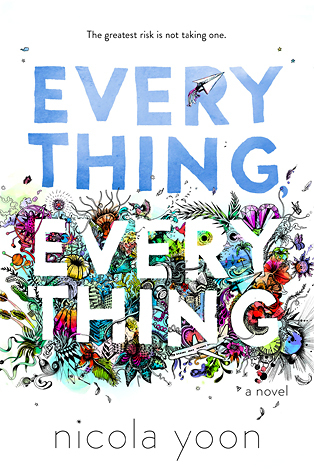by Nicola Yoon
My Rating:
My disease is as rare as it is famous. Basically, I’m allergic to the world. I don’t leave my house, have not left my house in seventeen years. The only people I ever see are my mom and my nurse, Carla.
But then one day, a moving truck arrives next door. I look out my window, and I see him. He’s tall, lean and wearing all black—black T-shirt, black jeans, black sneakers, and a black knit cap that covers his hair completely. He catches me looking and stares at me. I stare right back. His name is Olly.
Maybe we can’t predict the future, but we can predict some things. For example, I am certainly going to fall in love with Olly. It’s almost certainly going to be a disaster.
But then one day, a moving truck arrives next door. I look out my window, and I see him. He’s tall, lean and wearing all black—black T-shirt, black jeans, black sneakers, and a black knit cap that covers his hair completely. He catches me looking and stares at me. I stare right back. His name is Olly.
Maybe we can’t predict the future, but we can predict some things. For example, I am certainly going to fall in love with Olly. It’s almost certainly going to be a disaster.
I received a copy of Everything, Everything from Netgalley in exchange for an honest review.
Everything, Everything follows the life of Maddy who has an incredibly rare illness which means that she's basically allergic to, well, everything. If she went outside she'd probably die. She's never been able to make real friends her own age or go to school or learn to drive or go on a date. Then a new family moves in next door, and Maddy meets Olly...
What an easy read this was! I sped through Everything, Everything, which was just what I needed because, before I picked it up, I could feel myself falling into a post-amazing book slump after I finished Katherine Addison's The Goblin Emperor. Maddy's narrative voice was so easy to fall into, and I loved her sense of humour. I wasn't sure what someone who's allergic to everything would be like, but Maddy was rarely self-pitying or bitter, even though she had every right to be, nor was she a saint. She was an ordinary girl, who also just happened to be ill.
This is quite possibly one of the most diverse books I've ever read, though considering Nicola Yoon's own feelings for the #WeNeedDiverseBooks campaign I'm not all that surprised. Maddy is mixed race; half of her ancestry is Asian (Japanese, I think?) and the other half is African American. I haven't read a single book starring another character with that background, so that was fantastic. And there wasn't only Maddy; Maddy's mother, her nurse, and Olly's friend were all people of colour, which is awesome.
The best thing about it, though, was that it didn't feel like Yoon was trying to do a racial paint by numbers. It never felt as though she was including these people 'just to be diverse', but that she was including these people because when she looks at the world it isn't, and never has been, all white. I loved that.
I thought the romance in Everything, Everything was believable and really quite lovely. Maddy and Olly were great together, but they were also great separately, too, which doesn't always happen when you get stories in which the romance is one of the main aspects rather than a sideplot. I could understand why the two of them fell so deeply in love with one another and, perhaps more importantly, I as a reader was hoping for their happiness.
The only thing I had a problem with was that some aspects of the story felt too easy. For example, I would have liked to have known more about Olly's sister and I feel like the only reason we didn't see more of her is because it was easier to just not write about her. Does that make sense? There is also something that happens near the end of the novel that I did kind of like, it's certainly interesting and quite suspenseful, but then it's also a little unbelievable, and another part of me can't help feeling that perhaps Yoon didn't know how else to end it, and so she ended it the way she did. That's so unhelpful, I know, but it's impossible to talk about the thing I'm talking about without spoiling the novel.
All in all, I did enjoy this. For a debut novel it's pretty good! Contemporary isn't the genre I usually lean towards, but I sped through this in two sittings, and definitely recommend it to anyone who's been eying it up.

















